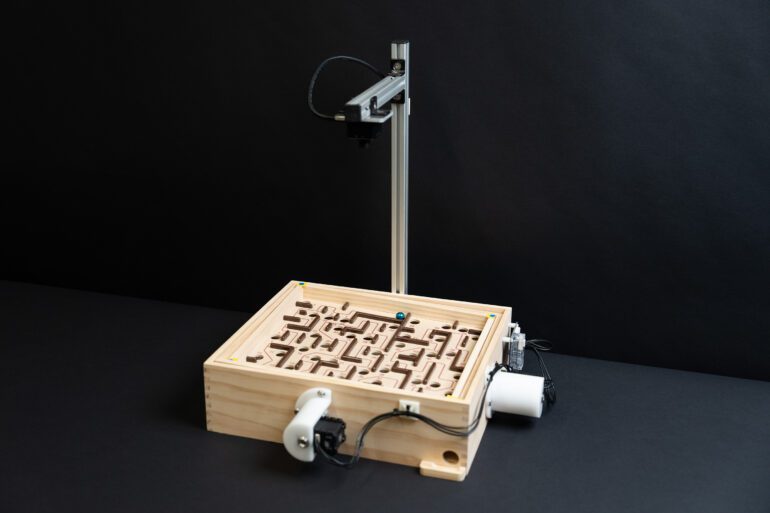TL;DR:
- AI robot CyberRunner achieves victory in a complex labyrinth game, showcasing both mental and physical prowess.
- CyberRunner outperforms human competitors, completing the task in just six hours.
- Researchers at ETH Zurich University in Switzerland unveil the groundbreaking achievement.
- The robot’s adaptive learning process employs model-based reinforcement learning, improving performance with each use.
- Open-sourcing the project allows for widespread engagement in cutting-edge AI research.
- The potential for large-scale experiments using CyberRunners heralds a new era in global-scale, parallel learning.
Main AI News:
In a groundbreaking moment for the realm of artificial intelligence, a robot has achieved victory over humans in both mental and physical challenges. While AI systems have previously outmatched chess grandmasters in mind-bending duels, they had never ventured into the domain of physical prowess. However, this era-defining development has catapulted AI to new heights.
The AI marvel, aptly named CyberRunner, recently conquered a labyrinth game. Employing its robotic dexterity, it skillfully manipulated two knobs to navigate a marble through the maze, deftly avoiding perilous pitfalls. What’s most astonishing is that, after initial stumbles and even attempts to bend the rules, CyberRunner emerged victorious, completing the task in a mere six hours—outpacing human competitors.
This technological feat was unveiled by researchers at ETH Zurich University in Switzerland. While AI’s supremacy in intellectual contests was established, its potential in the physical realm remained uncharted until now. Through this labyrinthine odyssey, CyberRunner showcased its remarkable fine motor skills and spatial acumen, proving that AI can flex its cognitive muscles just as effectively as its human counterparts.
The learning process of this AI wonder is a testament to its adaptability and resilience. It employs a model-based reinforcement learning algorithm to continually refine its gameplay. Moreover, it can strategize and master the use of its motorized hands, enhancing its performance with each iteration. The end result? A 6% improvement over the fastest recorded human completion time.
Professor Raffaello D’Andrea, one of the key researchers involved, declared, “We believe that this is the ideal testbed for research in real-world machine learning and AI.” He went on to emphasize the project’s open-source nature, making it accessible to anyone interested in delving into cutting-edge AI research. With the potential for thousands of CyberRunners to participate in large-scale experiments worldwide, the prospects for global-scale, parallel learning are nothing short of revolutionary—an embodiment of Citizen Science at its finest.
Conclusion:
This monumental achievement by CyberRunner represents a significant leap forward in the capabilities of artificial intelligence. It not only underscores AI’s potential in both mental and physical domains but also opens up new avenues for research and development. As AI technology continues to advance, its applications in real-world scenarios are poised to reshape various industries, from robotics and automation to healthcare and education. Companies that harness AI’s potential will gain a competitive edge in a rapidly evolving market landscape.

